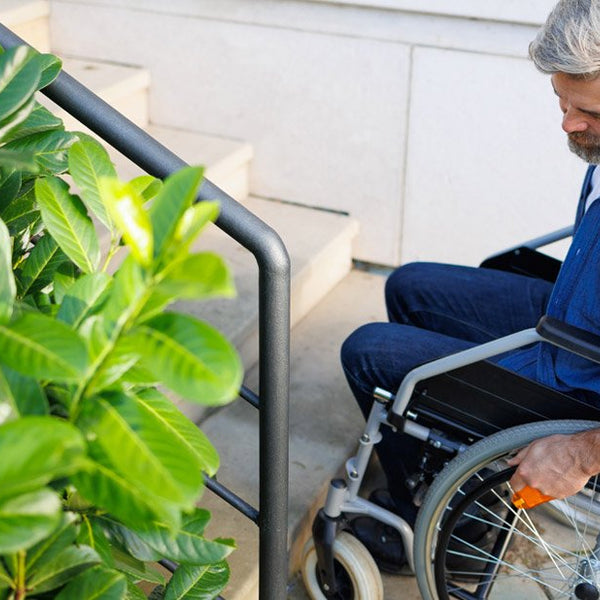Reading time: 3 minutes
According to Ofcom research, 55% of over 65s use a smartphone and 59% have their own social media profiles. 9% of over 65s use a mobile phone as their only way to access the internet.
These figures show that we can no longer assume older family members have no interest in technology and communicating online. Many older people are embracing the convenience that technology can bring to their lives.
The last few years have highlighted the need for us to stay connected to friends and family when we are unable to be physically close to them.
With over 3.6 million older people living alone, mobile phones are a wonderful tool for helping to alleviate loneliness and isolation as well as providing a lifeline in an emergency.
However, no-matter how useful they can be, there are a few things to consider when looking for a phone that will be simple and easy for an elderly relative to use. Conditions such as poor eyesight, arthritis, memory loss or poor hearing will impact what kind of features you might need from a phone.
In this article, we look at important features in mobile phones for elderly people and look at some of the most recommended makes and models in 2023.
Jump to:
- Important features of easy-to-use mobile phones for the elderly
- The best current models of mobile phones for elderly people (2023)
- Alternatives to mobile phones for elderly people
Important features of easy-to-use mobile phones for the elderly
Here are some of the top things to consider when choosing a mobile phone for elderly loved ones:
- A large screen with adjustable font size and bright display that is easy-to-read indoors and outdoors.
- Big button mobile phones for elderly people to help avoid frustration from pressing the wrong thing.
- Good battery life, so the mobile phone will work when they need to make a call or use other functions of the device.
- A strong mobile signal for the carrier they use in the region where they live, and in the areas they frequently visit, so they can make a call when they need to.
- Simple to navigate and use. Smartphones have lots of features, but your elderly loved one may only want to use one or two.
- Consider alternatives to mobile phones too. Think about what they would use a mobile phone for. There may be other easier to use or more reliable solutions for video calls for example, or for getting help in an emergency.
1. Large screen on the mobile phone
If your loved one has impaired eyesight or easily gets headaches, it is a good idea to find a phone that has a large screen.
It is also worth checking what kind of accessibility options the phone has too, as this may enable the user to increase text size on menus and messages. Bigger than standard font size and a large screen will make it is easier for an older person to read the menus.
2. Big button mobile phone for elderly
Whilst most modern phones now come with touchscreens, many older people still prefer a phone with buttons. However, a touchscreen that enables you to increase the size of the keyboard may be preferable over small or fiddly buttons that mean they have to compromise on screen size.
If you can, test out a variety of different phone models to see which feels most comfortable for your family member. You could also consider using a touchscreen phone with a stylus as a way of making the buttons on a touchscreen easier to use.
3. Good battery life
Mobile phones can often give us reassurance that our older family members can get help easily if they need to. However, they’re no good in an emergency if your loved one finds the battery has run out when they want to use it.
One of the downsides with smartphones is that the batteries often don’t last as long as some of the simpler models. Consider whether your family member is able to remember to keep the phone regularly charged.
4. Strong signal
Just as with battery life, it is essential you can get a strong signal when you need it. Check out which networks offer the strongest signal in your area and the places that your loved one may visit on a regular basis.
The Ofcom website has a mobile signal checker that is free to use. Enter your postcode to check the mobile signal in your area.
5. Simple to navigate
It can seem great to have lots of useful features on a phone. However, if the menus are too complicated to navigate then the phone could become a source of frustration rather than reassurance.
Ask your family member what features are most essential to them. For example, do they need a reminders for remembering medication, or would they like a camera to be able to video call friends and family?
The best current models of mobile phone for elderly UK residents (2023)
TakingCare has no affiliation with any of these mobile phones or manufacturers and is unable to make personalised recommendations for mobile phones. However, expert reviews and user reviews repeatedly give high ratings to the below models in relation to elderly users.
Doro 8050
This smartphone is designed with older adults firmly in mind. The main focus is on usability, with a straightforward set-up process and an interface that is simple, especially in comparison to many other mobile phones. It has a combination of physical and touchscreen buttons, which many less tech-savvy older people may find easier to use if they are not very familiar with touchscreens, menus and apps.
Even the sim card port, which on most phones requires a special tool to open, can be opened by a fingernail on the Doro 8050. There are cameras on the front and back of the phone, which aren’t as advanced as many, but are sufficient for things like video calls with family members.
The Doro 8050 uses a version of Android’s operating system and groups most of the popular functions together for ease of use, such as call, send, search, help and view. There is also very easy access to their accessibility features, such as a screen magnifier. The phone has a small physical button on the back that can be pressed, which will send an alert to the assigned contact in the event of an accident or an emergency.
Nokia C21 Plus
A good budget option when it comes to mobile phones for elderly people is the Nokia C21 Plus, with extensive accessibility options and a simplified version of Android and apps, along with a large screen. It’s simple to change things such as font sizes and this phone also has a front and back camera, making it ideal for video calls with loved ones.
There is a fingerprint reader, which can be useful for older people who might struggle to remember login codes or passwords, so they can still access their phone and their apps when needed, as long as they know how to use the fingerprint scanner.
OnePlus Nord CE 2 5G
It certainly doesn’t have the most memorable name for a phone we’ve ever seen, but when it comes to mobile phones for elderly people, the battery on this model is known for lasting longer than most smartphones. This can be ideal for older people who may not be likely to remember to charge their phone every day. It also recharges really quickly once plugged in (from 0% to 50% in just over 10 minutes) which can be very useful if the battery does run down.
It runs on a basic version of Android, which is considered to be a good option for those who aren’t that tech savvy or are unfamiliar with very advanced smartphones.
Alternatives to mobile phones for elderly people
It is worth thinking about how your loved one will use their mobile phone. If it is mainly for staying connected with family through video calls, then there may be more suitable alternatives for doing this rather than on a mobile. For example, specific video calling devices designed for older people.
There are some kinds of situations or circumstances when a personal alarm system might be a good option alongside or instead of a mobile phone.
If they would use their mobile to get help in an emergency, a GPS personal alarm or personal alarm watch may be easier to use and offer better coverage thanks to a multi-network SIM.
For those who want a reliable device that they can use to get help in an emergency, a personal alarm for the elderly may be the perfect solution. These provide reassurance and peace of mind that help is available anytime of the day or night from a specialist monitoring centre.
Out-and-about personal alarms
Read personal alarm reviews and find out more about alarms that work at home and out-and-about and how the devices promote living independently


